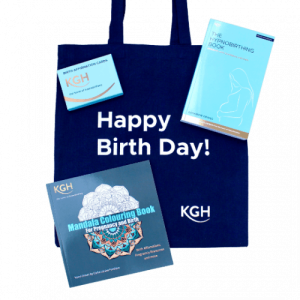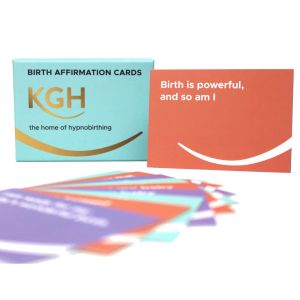Most new mothers experience the “baby blues” in the first few weeks after their baby arrives. This is from the effect of hormonal changes which can play a big part on your emotions. But postnatal depression is different and can last longer, or even arrive months after the birth.
With one in ten women suffering from postnatal depression, it a subject we should discuss more openly and there are many coping techniques to help women cope with the situation they find themselves in. Katharine was recently interviewed along with Liz Halliday, deputy head of midwifery at Private Midwives, by NetDoctor to discuss this subject.
What is postnatal depression?
PND is a type of depression that many parents experience after having a baby. Like other forms of depression, it can be mild, moderate or severe, and can come on gradually or suddenly. It’s different to the baby blues, a widely-experienced cluster of symptoms brought on shortly after the arrival of a newborn.
‘The baby blues are a very common phenomenon experienced by many women,’ says Liz Halliday. ‘They usually occur three to five days after birth and resolve within a time period of one to seven days. Hormonal changes, tiredness and the responsibilities of a baby can trigger the baby blues. All of this is quite normal, and most women need support and a little time to let them pass.’
PND, meanwhile, usually develops within six weeks of giving birth although it can emerge up to a year afterwards. ‘Postnatal depression, postnatal anxiety disorder and other perinatal mental health issues often don’t present immediately after birth and can emerge as the weeks or months roll on,’ she says. ‘They don’t resolve quickly and can worsen over time if help is not sought.’
What causes postnatal depression?
There are many possible causes for PND, and it’s likely that a combination of factors are at the root of postnatal depression symptoms. These include, but are not limited to:
A history of mental health problems, including depression.
Depression or anxiety during the pregnancy.
Lack of support from your partner, family or friends.
A stressful life event, such as a bereavement or job loss.
Relationship issues – particularly domestic violence or abuse.
Having experienced the baby blues.
Long-term sleep deprivation.
Nutrient deficiencies, such as low levels of vitamin B12.
A physical cause, eg an underactive thyroid.
If the birth has been traumatic or painful, ‘it’s much more likely that the mother will have PND,’ says Graves. Certain drugs may ‘inhibit the production of natural hormones, including oxytocin and endorphins,’ which can affect mother-baby bonding. ‘Now, not only does she have the most agonising and traumatic experience of her life to deal with, but she also has no time for herself or to rest, in order to process this,’ Graves adds.
Symptoms of postnatal depression
Postnatal depression symptoms can present in many different ways. Because they usually come on gradually, you may not realise you have PND. Symptoms may include:
Persistent feelings of sadness or low mood.
Feeling that you cannot cope or are unable to care for your child.
Difficulty bonding with your baby.
Irritability of feelings of anger.
Trouble sleeping at night and daytime exhaustion.
Uncontrollable feelings of worry or anxiety.
Withdrawing from other people.
Difficulty concentrating or making decisions.
Changes in appetite – eating too little or more than usual.
Lack of interest in sex.
Frightening or intrusive thoughts.
Negative thoughts – thinking you are not a good parent.
Guilt or low confidence – feeling as though you are at fault.
Lack of enjoyment and interest in things that used to give you pleasure.
Every person who experiences perinatal health issues has slightly different experiences, so it’s important to speak to someone who can help, explains Halliday. ‘They often feel guilty for not feeling joyous – or not coping – so they might hide their feelings and put on a brave face,’ she adds. ‘There is nothing to be ashamed of. Help is out there.’
Treatments for postnatal depression
If you suspect you might be suffering from PND, it’s important to speak with a professional for guidance and treatment options. Don’t struggle alone, hoping the problem will go away on its own. Depression is an illness like any other, and it can happen to anyone. It doesn’t make you a bad parent, and your baby will not be taken away from you. It’s very common to feel this way, and there is a huge range of help and support available to you.
The most effective course of treatment for your postnatal depression symptoms will depend on their nature and severity. Options include psychological therapy, such as cognitive behavioural therapy (CBT); medications, such as antidepressants; plus lifestyle changes and self-care strategies – opening up to your family and friends, exercising regularly, eating a healthy diet, improving your sleep quality, and making time to do things you enjoy.
‘Talk to your GP, midwife or health visitor,’ says Halliday. ‘They will recommend local organisations that can offer support. There are also several antidepressants that are considered safe while breastfeeding, if you decide this might be an option for you.’ Alongside conventional health professionals, you may also like to consider consulting a reflexologist, hypnotherapist or acupuncturist, adds Graves. ‘The important thing is to ask for help,’ she says.
14 ways to manage postnatal depression
Self-care is essential when it comes to managing PND. Even if you’re short on time, it’s important to prioritise your own mental wellbeing. ‘Self-care is important for everyone, but a new parent may feel overwhelmed and exhausted, and a bit of self-care can really make a difference,’ says Halliday. Here’s how to prioritise your health with PND:
1. Eat well
It needn’t be time-consuming – stock up on healthy snacks and fill your freezer with nutritious, easy-to-make meals. ‘Nutritious food will feed your body and help you to heal,’ says Halliday. ‘Biscuits and chocolate will only give a short energy burst followed by a sugar crash. So have your chocolate bar, but maybe after a decent meal.’
2. Nap as often as possible
Sleep tends to be especially elusive in the first few months, so rest whenever possible. Mums who get the least sleep experience the most depressive symptoms, one study found. Divide baby duties with your partner where you can, so both of you can get a few hours. ‘With the new baby, you won’t be sleeping long hours,’ says Graves. ‘When the baby sleeps, try to take a nap.’
3. Take regular exercise
A full-body bootcamp might be out the window – at least at first – but don’t underestimate the benefits of strapping on a baby carrier and heading outside. Walking has a statistically significant effect on symptoms of depression, a study published in Mental Health and Physical Activity found. ‘Don’t overdo it in the early days, but a short walk or a yoga class can boost endorphins, which will make you feel better,’ says Halliday.
4. Don’t forget ‘you’ time
Taking some time out isn’t selfish. In fact, it’s one of the best things you can do to give your mental health a boost. ‘Having even 20 minutes to grab a shower, a hot cup of coffee or even a short walk outside without baby can give you a little time to remember that you are still you,’ says Halliday.
5. Take a fish oil supplement
Women who have low levels of DHA – a type of omega-3 fatty acid – have higher rates of postpartum depression, one study found. The physiological demands of pregnancy and breastfeeding put childbearing women at particular risk of deficiency, the authors wrote, so consider taking a fish oil supplement to keep your levels topped up.
6. Forget the housework
Let non-urgent life admin slide while you focus on your health and the baby. ‘In the time you do have, pamper yourself and rest,’ reminds Graves. ‘It doesn’t matter that your home isn’t clean and the washing up hasn’t been done. A bit of dirt strengthens your child’s immune system!’ So don’t forget to cut yourself some slack.
7. Ask for help
Be specific about what you need – and try not to get caught up in whether they’re doing it ‘properly’. ‘If someone visits, ask them to pop the kettle on or cuddle the baby while you grab a quick shower,’ advises Halliday. ‘If someone offers you a meal, say yes! Accept help and repay the favour in the future.’
8. Open up about how you feel
You don’t need to meet in person to reap the benefits – help is just a phone call away. Telephone-based peer support has been shown to help reduce postnatal depression in research published in the journal Wiley. At the start of the study, all mothers were moderately depressed, but after regularly speaking with trained mothers who had previously experienced PND, just 11.8 per cent were depressed when the trial ended.
9. Alleviate loneliness
Seek out new friendships through support groups, such as local community forums or special interest groups. ‘There will be coffee mornings for local mums, and baby and toddler groups that you can attend,’ says Graves. ‘These are available almost everywhere. Ask at your health clinic or your GP, or ask your partner to help you with ideas. This is very important.’
10. Take one step at a time
Let go of your expectations of what parenthood ‘should’ be, and roll with the punches. Being flexible and focusing on the present moment – whatever that might entail – will prevent you from becoming frustrated. ‘Try not to think about tonight or tomorrow,’ says Halliday. ‘Dealing with what’s going on right now is enough. Worrying about the future won’t help anything.’
11. Make a list
Can’t stop ruminating? Put pen to paper. ‘Write down what you think you have to do later and then leave it until later,’ Halliday continues. ‘Or even better, ask someone else to help you.’ You could even start a mood journal – recording your experiences and feelings can be a useful tool in understanding and bolstering your mindset.
12. Breathe deeply
The relaxation techniques that you practised in pregnancy ready for your birth can be equally useful after birth, explains Graves. ‘The simple, long, slow “up” breathing is beneficial in any circumstances, and especially when you feel depressed. On the beautiful, gentle, long, slow, “out” breath, you produce oxytocin – the hormone of calm, connection and love.’
13. Don’t be afraid to cry
When life gets too much, ‘let it all out,’ says Halliday. ‘Call a friend or sit with your partner if you want to, but let the tears flow. Bottling emotions up can make you feel worse. Sometimes a good cry followed by a hot bath can really help.’
14. Try online therapy
If you don’t have time for traditional therapy, why not explore your thoughts and feelings through an online course? In a study by the University of Exeter, mothers reported better results for depression, work and social impairment, and anxiety immediately after receiving internet-based therapy. They also reported better results for depression six months after treatment.
Further help and support
For additional support with anything related to parenting try one of the following resources:
Association for Postnatal Illness : a charity providing support to mothers suffering from postnatal illness.
Mind: support for new mums to manage the everyday, nurture themselves and dispel the many myths of motherhood.
Mothers For Mothers Postnatal Depression Support Group: support, advice, information and a listening ear for any worries or concerns from real mums.
NCT: a charity offering support to new mums.
Pre and Postnatal Depression Advice & Support: trusted support service for families suffering from prenatal/antenatal and postnatal illnesses.
Source – NetDoctors, February 2021. The full article can be found here.









